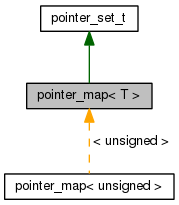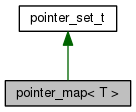pointer_map< T > Class Template Reference
#include <pointer-set.h>
Inheritance diagram for pointer_map< T >:

Collaboration diagram for pointer_map< T >:

Public Member Functions | |
| pointer_map () | |
| ~pointer_map () | |
| T * | contains (const void *p) |
| T * | insert (const void *p, bool *existed_p=NULL) |
| void | traverse (bool(*fn)(const void *, T *, void *), void *data) |
Protected Attributes | |
| size_t | log_slots |
| size_t | n_slots |
| size_t | n_elements |
| const void ** | slots |
Private Attributes | |
| T * | values |
Detailed Description
template<typename T>
class pointer_map< T >
A pointer map is represented the same way as a pointer_set, so the hash code is based on the address of the key, rather than its contents. Null keys are a reserved value. Deletion is not supported (yet). There is no mechanism for user control of hash function, equality comparison, initial size, or resizing policy.
Constructor & Destructor Documentation
template<typename T >
| pointer_map< T >::pointer_map | ( | void | ) |
Allocate an empty pointer map.
template<typename T >
| pointer_map< T >::~pointer_map | ( | void | ) |
Reclaims all memory associated with PMAP.
References pointer_set_lookup().
Member Function Documentation
template<typename T >
| T * pointer_map< T >::contains | ( | const void * | p | ) |
Returns a pointer to the value to which P maps, if PMAP contains P. P must be nonnull. Return NULL if PMAP does not contain P. Collisions are resolved by linear probing.
Referenced by streamer_tree_cache_append().
template<typename T >
| T * pointer_map< T >::insert | ( | const void * | p, |
| bool * | existed_p = NULL |
||
| ) |
Inserts P into PMAP if it wasn't already there. Returns a pointer to the value. P must be nonnull.
For simplicity, expand the map even if P is already there. This can be
superfluous but can happen at most once. ??? Fugly that we have to inline that here.
References pointer_set_lookup(), slots, and T.
template<class T>
| void pointer_map< T >::traverse | ( | bool(*)(const void *, T *, void *) | fn, |
| void * | data | ||
| ) |
Pass each pointer in PMAP to the function in FN, together with the pointer to the value and the fixed parameter DATA. If FN returns false, the iteration stops.
Field Documentation
|
inherited |
Referenced by pointer_map_contains(), and pointer_set_insert().
|
inherited |
Referenced by pointer_map_contains(), and pointer_set_contains().
|
inherited |
Referenced by pointer_map_contains(), pointer_set_contains(), pointer_set_insert(), and pointer_set_lookup().
|
inherited |
Referenced by pointer_map_contains(), pointer_set_insert(), and pointer_set_lookup().
template<typename T>
|
private |
The documentation for this class was generated from the following file:
